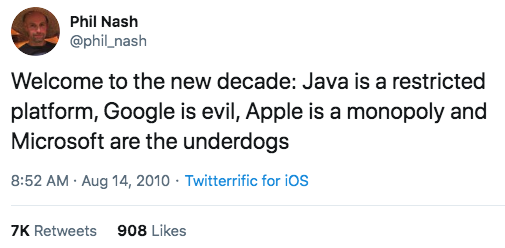Cookies, Super Cookies, Your Privacy (2011)
Web tracking tech is so complex today that it's practically impossible not to be tracked. Together with social media site such as Facebook, Twitter, Linkedin, often that means that advertisers not only know your browsing habits, but also your name, phone number, location, who your friends are, down to what you been doing, and they have it stored on their data centers.
Here is a series of 3 great articles on the issue, from Electronic Frontier Foundation.
- New Cookie Technologies: Harder to See and Remove, Widely Used to Track You
- By Seth Schoen.
- https://www.eff.org/deeplinks/2009/09/new-cookie-technologies-harder-see-and-remove-wide
- How Online Tracking Companies Know Most of What You Do Online (and What Social Networks Are Doing to Help Them)
- By Peter Eckersley.
- https://www.eff.org/deeplinks/2009/09/online-trackers-and-social-networks
- Browser Versions Carry 10.5 Bits of Identifying Information on Average
- By Peter Eckersley.
- https://www.eff.org/deeplinks/2010/01/tracking-by-user-agent
Turn Off Cookies?
If you don't want to be tracked, just turning off cookies is useless today. Here's what you have to do:
- Turn off cookies.
- Turn off Flash. (See: How to Delete Flash Cookies (2011))
- Turn off JavaScript. (prevents HTML5 Storage)
- Turn off, remove, any browser add-on/plug-in/extensions. (they can do almost arbitrary things on your computer.)
- Use Tor (anonymity network) at torproject.org (for preventing logging your IP address.)
My Personal Habit for Online Privacy
Since about 2004, i usually use 3 browsers simultaneously. My main browser has cookies and JavaScript off (this is usually Firefox). This browser is used for normal browsing. And i use other browsers for banking or social network sites that i have accounts. My thinking was that, when i do normal browsing of random sites, with all their wild ad networks and web bugs and stuff, especially porn sites, i don't want to be tracked.
I should've known, but didn't realize, that this approach is rather stupid since around ~2004 because i have Flash on. Because Flash's ability to track is far greater than HTTP cookies.
My multiple-browser usage also is becoming quite inconvenient. For example, i use Google Chrome for my gmail and all my Google services and other sites i have a account such as Facebook and Twitter. Right there is a problem, because Facebook is notorious for not respecting user privacy. (See: Facebook's Ethics (2010)) And suppose i'm in my personalized Google home page iGoogle, and i want to click on links of news. If i click, that means the site i'm visiting will be able to use cookies and possibly connect with all other data on all other sites i have a account. (even for reputable news sites such as Time, New York Times, CNN, etc.) What i do usually is right-click to copy the link, switch to Firefox where cookies is off, then open new tab, paste, and browse there. This is quite inconvenient.
Of course, there are various browser features and plug-ins that block ads, allow HTTP cookie or Flash only for certain sites you choose, and so on. But these again are not convenient. You constantly have to fight with upgrades, new setting interfaces, spend hours to find and learn the new setting location in different interface and different browsers and versions. Do that for multiple computers you have.
Also, increasingly over the years, many web sites won't work well without JavaScript. (e.g. maps, video sites.)
Do you want Convenience or Privacy?
Remember that HTTP Cookie and JavaScript was invented by Netscape (daddy of Firefox) in around 1995. It was out-cried by privacy organizations as well as in mainstream media, but soon caught on and become a standard, inevitably because web commerce requires it. Would you rather have the ability to shop online (started with Amazon, Ebay), or would you rather have full privacy? In effect, people have chosen convenience over privacy.
But HTTP Cookies and JavaScript tech are limited. So in 2000s, there comes Macromedia Flash (which is bought by Adobe in late 2000s). The question is, would you rather be able to enjoy online games and watch videos, or would you rather have privacy? Again, people's actions have spoken: we want convenience.
So, all the privacy warnings by orgs such as Electronic Frontier Foundation or Free Software Foundation are pretty much fringe concerns for average people.
This doesn't mean that most people don't care for privacy, just that it's too complex and too much effort to do anything about it, given the way the web tech are. I'm not sure how this issue can be resolved.
One good solution is to build privacy related issues into the tech itself. EFF has a good article on this:
- Mozilla Leads the Way on Do Not Track
- By Rainey Reitman.
- https://www.eff.org/deeplinks/2011/01/mozilla-leads-the-way-on-do-not-track
Today's user may think that Firefox is the good guy, while Microsoft Internet Explorer is the bad guy. Certainly Firefox woundn't mind spreading that impression. Remember that Firefox came from the Mozilla org, which is originally Netscape, and Netscape was the one that started with the cookies, JavaScript, and other hated “greedy” tech such as blinking tags while it was soaring in mid 1990s. (anyone still remember dot com bubble?)

Researchers Expose Cunning Online Tracking Service That can't Be Dodged By Ryan Singel. @ http://www.wired.com/epicenter/2011/07/undeletable-cookie/